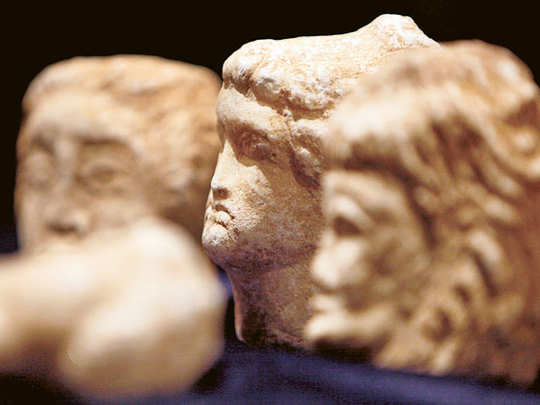
Tripoli: Officials from Libya's ruling National Transitional Council will question Saif Al Islam, son of Muammar Gaddafi and the presumed heir of the late Libyan leader, in connection with an investigation into the selling of plundered artefacts by Gaddafi loyalists to fund fighting.
"We need to ask him about the missing things," said Ahmad Al Majub, a senior official in charge of several archaeological sites and the town of Bani Walid. "They are priceless because they are an insight into our history."
Saif Al Islam commanded units in Bani Walid after fleeing the capital, Tripoli, at the end of August. In September, the town's museum was ransacked by loyalist forces and ‘priceless' Roman artefacts disappeared, including 25 bronze coins and 23 oil lamps, Al Majub said.
‘Huge amount'
While Libya's key monuments, including the Roman cities of Sabratha and Leptis Magna, were untouched during the eight-month conflict to oust Muammar Gaddafi, many museums were pillaged, according to Saleh Aga, chairman of the Libyan Department of Antiquities.
"There are a lot of cases representing a huge amount of money," he told reporters in Tripoli referring to the alleged thefts by Gaddafi loyalists. "They want to use the sale to fund their aggressive struggle."
Convoys of cars carrying Gaddafi supporters crossed the border into Niger and Algeria during the fighting. Among them was another of his sons, Sa'adi, whose extradition is being sought by the NTC.
It's impossible to know how much treasure was looted as cataloguing was incomplete during the Gaddafi era, Aga said.
Unesco help
Seventeen carved stone heads, most the size of a fist and believed to date from Roman times, and terracotta items found in a sack in a loyalist vehicle intercepted by NTC fighters in August, were among items displayed during the news conference.
Aga said his department has no idea of the value of the heads or their origin and is in contact with the United Nations cultural agency Unesco for assistance. The Libyan authorities will soon forward information on the stolen objects to Interpol, the international police organisation, he said.
Other artefacts known to have been plundered include several thousand coins reported by the NTC in February to have been stolen from a museum in Benghazi, where thieves broke into the building by drilling through the roof.
Carthaginians, Greeks, Romans and Ottomans all occupied parts of Libya, leaving behind a rich legacy.












